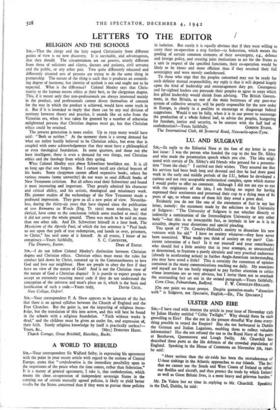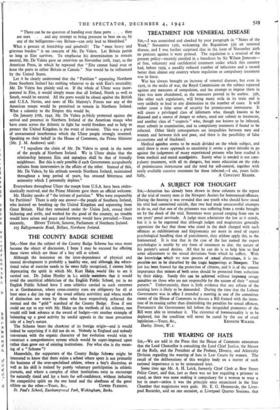ULSTER AND EIRE
Sm,—I have read with interest the article in your issue of November 13th by Julian Huxley entitled " Celtic Twilight." Why should there be such grovelling to Eire? Has she not in the present dreadful War done every- thing possible to retard the Empire? Has she not harboured in Dublin the German and Italian Legations, enabling them to collect valuable information? Has she not refused the use to the Royal Navy of the ports at Berehaven, Queenstown and Lough Swilly. Mr. Churchill has described these ports as the life defences of the crowded population of England. Speaking in the House of Commons on November 5th, 194o, he said: "More serious than the. air-raids has been the recrudescence of U-boat sinkings in the Atlantic approaches to our islands. The fact that we cannot use the South and West Coasts of Ireland to refuel our flotillas and aircraft, and thus protect the trade by which Ireland as well as Great Britain lives, is a most heavy and grievous burden."
Mr. De Valera lost no time in .replying to Mr. Churchill. Speaking in the Dail, Dublin, he said:
" There can be no question of handing over these ports . . . they are ours . . and any attempt to bring pressure to bear on us, by any of the belligerents—say Britain—can only lead to bloodshed." What a gesture of friendship and goodwill! The "most heavy and grievous burden " is no concern of Mr. De Valera. Let Britain perish so long as Eire survives. To emphasise his determination to remain neutral, Mr. De Valera gave an interview on November loth, 1940, to the American Press, in which he repeated that " Eire cannot hand over or lease the ports to either Britain or Canada." Nor would he be influenced by the United States.
Let it be clearly understood that the " Partition " separating Northern from Southern Ireland has nothing whatever to do with Eire's neutrality. Mr. De Valera has plainly said so. If the whole of Ulster were incor- porated in Eire, it would simply mean that all Ireland, North as well as South, would be neutral. All the ports would be closed against the British and U.S.A. Navies, and none of His Majesty's Forces nor any of the American troops would be permitted to remain in Northern Ireland. What a calamity to the Empire this would be.
On January 27th, 1942, Mr. De Valera publicly protested against the arrival and presence in Northern Ireland of the American troops who have come across the Atlantic to fight for world freedom and to help to protect the United Kingdom in the event of invasion. This was a piece of unwarranted interference which the Ulster people strongly resented. Speaking on their behalf in the House of Commons, the Prime Minister (Mr. J. M. Andrews) said:
" I repudiate the claim of Mr. De Valera to speak in the name of the people_ of Northern Ireland. We in Ulster desire that the relationship .between. Eire and oqrsebres shall be that of friendly neighbours. But this is only possible if each Government scrupulously refrains from intervention in the affairs of the other. Instead of this, Mr. De Valera, by his attitude towards Northern Ireland, maintained throughout a long period of years, has aroused bitterness and animosity which I personally deplore."
Everywhere throughout Ulster the troops from U.S.A. have been enthu- siastically received, and the Prime Minister gave them an official welcome.
Mr. Huxley speaks of " the irritant of partition." Who were responsible for Partition? There is only one answer—the people of Southern Ireland, who insisted on breaking up the United Kingdom and separating from Great Britain. Had they remained under the Union Jack, ceased their bickering and strife, and worked for the good of the country, no trouble would have arisen and peace and harmony would have prevailed.—Yours



























 Previous page
Previous page